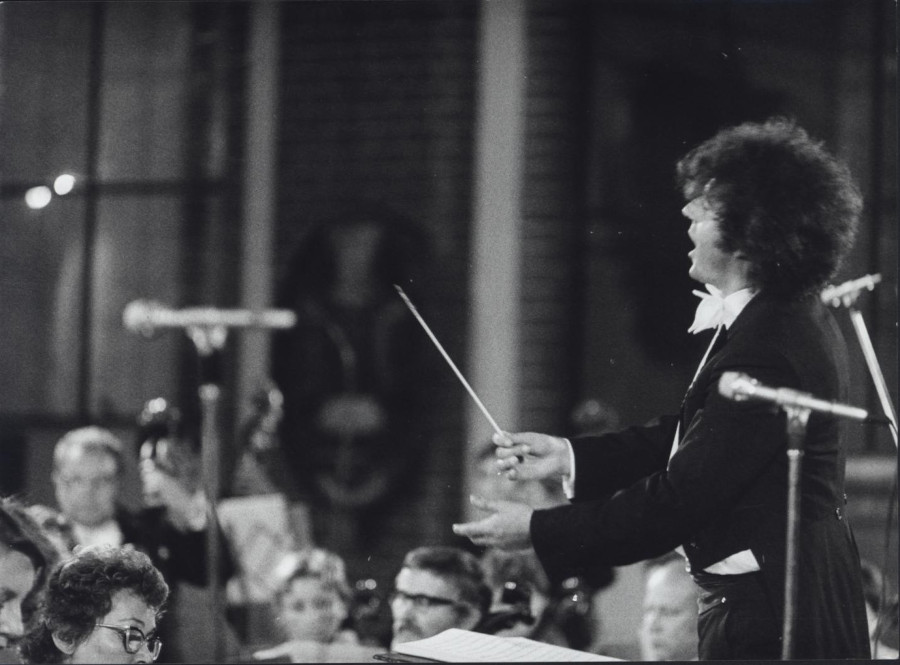In the 1970s, Wrocław’s music life was undoubtedly the most thriving element in the city’s cultural landscape. Success followed success, although there were also painful losses at times.
The destruction of the Engler organ in the greatest post-war fire in Wrocław led to the closing down of Organ and Harpsichord Music Days in 1978.
The Philharmonic organized them together with the Polish Radio broadcasting station, distinguished organists and harpsichordists from Poland and abroad were invited, and the audience had the opportunity to get to know works that were rarely included in the Philharmonic programmes. This beautifully unfolding festival was interrupted by a fire at St Elizabeth church, which broke out on 9 June 1976, on a warm Wednesday evening.
The fire consumed, among others the Engler pipe organ known as the “Voice of Silesia”. Its building was commissioned to the outstanding organ builder Michael Engler in 1750, it lasted for eleven years, to be completed several months after Michael’s death. The instrument, made of 3077 pipes (56 voices), was consecrated in September 1761, on the day of Michael Engler’s patron saint. And although the organ underwent two major reconstructions (the last one was carried out in the 1940s), it sounded great and was a strong musical attraction of the post-war Wrocław.
This can be heard on a Polskie Nagrania album from 1963 (works by Johann Sebastian Bach were then played on Engler’s instrument by Prof Józef Chwedczuk from the Academy of Music in Kraków). We also know that the recordings from May 1976, i.e. made just before the fire, are stored in the Wrocław branch of Polish Radio. When the fire was devouring the organ choir on 9 June at some point all the pipes sounded at once. For the last time.
In 1980, a fire broke out again [of social unrest, leading to the emergence of Solidarity as the first independent trade union in communist Poland and the signing of the Agreements of August – translator’s note], but this time it engulfed the entire city and did not go down for sixteen months. But cultural life did not recede into the background, even during the August strikes, artists used to visit the protesters and give concerts. Besides, music also had its political face. In January 1981, the Congress of Polish Composers passed a resolution “to restore to Polish culture composers and musicologists who lived abroad who were absent from our cultural life for non-artistic reasons”.
At this turning point, changes also affected the Wrocław Philharmonic, which said goodbye to its Director, Tadeusz Strugała (he, however, retained the management of the Wratislavia Cantans festival and the Chopin Festival in Duszniki) and passed into the hands of Marek Pijarowski. It was a great sensation, because although the gray hair does not make one a sage, the 29-year-old General and Artistic Director of such a prestigious institution was a phenomenon on a national scale.
But Pijarowski had already had great successes: in 1974, as the youngest participant, he won the first prize at the Grzegorz Fitelberg competition in Katowice, and three years later he became a finalist of the Herbert von Karajan Competition in Berlin. He was associated with the Wrocław Philharmonic since his debut in 1973 – first as assistant to Tadeusz Strugała, then as Associate Conductor – so it can be said that the change of management took place in a “velvety” manner.
The new director did not spare pleasures to music lovers, bringing to them during the “Solidarity” carnival outstanding violinists: Roman Totenberg from the USA, Russia’s Oleg Kagan (a very talented artist who collaborated with Svetoslav Richter, and died at the age of 44, but the recordings confirm his excellent reputation), and Vadim Brodsky. Brodsky, a Ukrainian virtuoso, descendant of the great Adolf Brodsky, the first performer of Piotr Tchaikovsky’s Violin Concerto, was already living in Warsaw in the late 1970s, so this transfer was easier.
The invited pianists also belonged to the top music league. Before the long December night of martial law came, in Wrocław there were visits by, among others, Nikita Magaloff, Lev Vlasenko, and Rudolf Kerer, alongside several winners of the 1980 Chopin Competition, headed by Dang Tai Son. The Vietnamese won the first prize, although the greatest sensation was caused by Ivo Pogorelić from Yugoslavia: he won the mass sympathy of the audience and caused arguments in the conservative jury, which prevented him from reaching the final stage, considering his interpretations as too deviating from the performance canon.
There were no scandals in Wrocław, the audience came in abundance, the box office even lacked seats, the Wrocław Philharmonic played a lot and under the leadership of interesting conductors (Pijarowski brought in, among others, Jean-François Monnard and Paul Angerer), but it all ended after martial law was declared. Although the break in the concerts lasted only a month, it was not possible to arrange an attractive programme with star soloists, since the borders were closed and the arrival of musicians from another city required obtaining special passes. The time of “great sadness” began.
Beata Maciejewska

